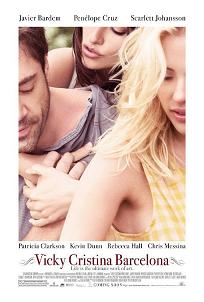Vicky Cristina Barcelona review by Jackass Tom
When talking about Vicky Cristina Barcelona I have to start by getting this off my chest. The most awkward thing about Vicky Christina Barcelona is this constant running voice-over that explains what is going on in the film. It’s not Allen’s voice and it’s not anyone in the film (at least who I recognized) so that lead me to a theory that it was likely the product of a snap reaction to a bad screening at a university in Who-Knows-Where. The voice-over explained scenes to the point where I could have been blind and followed the film and did so in a number of places. Was the film really that hard to follow without a voice over? Do I need to hear, “The next day Cristina received a phone call from Juan Antonio inviting her to his home,” while she is on the phone saying “Sure that would be great,” and then at his home in the next shot? Does the film assume that as an audience member, I need an introduction to Vicky and Cristina in order to understand that one is flirtatious and adventurous and the other is conservative and plays-by-the-rules? A good film (which this film is) should be easy enough to follow that the characters will reveal themselves as such, and that I don’t need a film-caddy to haul my bag around the course. I’m not against a voice over when it is used in proper situations, but in this movie it seemed strange, out of place and against Allen’s better judgment. The only reason I could see the filmmakers wanting to keep it in the film was to teach the audience more about Barcelona, explain its connection to Gaudi, guitar music, etc. Other than that I’m grasping at straws.
So now that I have gotten that out of the way, Vicky Cristina Barcelona is a fine film by Woody Allen despite the flaw noted above. It explores the Barcelona summer of two girl-friends, the good-girl who has her life planned and things are going according to plan because she is about to marry a guy with a good job, Vicky (Rebecca Hall) and the open-minded experimental passionate hasn’t found what she is looking for but knows she hasn’t found it Cristina (Scarlett Johansson). They are having the average summer vacation, site seeing, taking in local music, tasting local food and wine, when they are interrupted by a painter named Juan Antonio (Javier Bardem) who invites them for a weekend in Oliveta that includes love-making. Of course one is interested and turned on (Cristina) and the other is turned off completely (Vicky).
The two go along for the weekend which doesn’t turn out as expected. Instead of having an endless romp of a weekend with Juan Antonio, Cristina spends most of her time sick in bed. Meanwhile Vicky explores the native land, opens up more to Juan Antonio and eventually the two unexpectedly bed down. Cristina eventually withdraws and is filled with guilt as she has cheated on her fiancé (infidelity – never found far from the plot of a Woody Allen film). Vicky picks up where she left off with Juan Antonio, unaware of what had happened between him and Cristina.
The film is really about how different the two friends are and how they are both searching for “something” they cannot find but in different ways. In Cristina, the search is for a greater love than the last and a greater experience than the last. She wants to see the world but never feels satisfied enough to settle. Whereas Cristina’s issues are at the surface and on display, Vicky’s issues are hidden beneath the surface. She tells everyone she has what she wants and everything is working out in her life, but the minute that her perfect line of sight is disrupted (i.e. Juan Antonio’s seduction) she is forever doubtful about the path she has chosen. And unlike Cristina who is willing to attempt to figure out what might bring her completeness (even though nothing will), Vicky remains restrained and so over-controlled that she needs to be pushed out of her comfort zone. Allen does a deft job at examining other relationships within the film including the ironically harmonious three-way relationship between Cristina, Juan Antonio and his fiery ex-wife Maria Elena (Penelope Cruz).
If it hadn’t been for the re-occurring, and impossible to ignore narration I probably would have enjoyed the film a lot more. Removing the narration I think would yield a finer piece of work; not Allen’s best work but possibly one of his two best works in the past ten years (Match Point being the other that comes to mind). Even at the ripe old age of 75, Woody Allen can still write and direct a better film about the conflicts of romance, love, and fidelity than just about anyone else.






6 out of 10 Jackasses blog comments powered by Disqus
